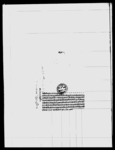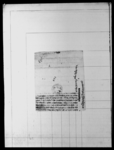A rukkā from King Rājendra directing Garuḍadhvaja Pā̃ḍe to restart the pajanī on Lubhu serā land (VS 1878)
ID: DNA_0014_0048
Edited and
translated by Surabhi Pudasaini
in collaboration with
Rabi Acharya
Created: 2022-07-21;
Last modified: 2023-03-28
For the metadata of the document, click here
The accompanying edition, translation/synopsis and/or commentary are available under the terms of the Creative Commons Attribution-ShareAlike 4.0 International License
Abstract
This rukkā from the king, who according to the date must have been Rājendra, directs Kapardāra Garuḍadhvaja Pā̃ḍe to restart the annual pajanī of tenants on Lubhu serā land.Diplomatic edition
[1r]
1श्रीदुर्ग्गा\[Royal seal]1स्वस्तिश्रीमन्महाराजाधिराजकस्यरुक्का¯ ¯ ¯ ¯ ¯ ¯ ¯ ¯ ¯ ¯ ¯2आगेकपर्दारगरुडध्वजपाँडेप्रतितैरातैनाथिलुभुसेरामाअघिपनिमोहिको
3पजनिहुदोरहेछसतरि७०सालमालुभुगाउरसेराकोफेरामावश्न्यासाना
4गाउल्यालेकमाइवाकिरह्याकोषेतअंतकाप्रर्जालाइजोताउनुभनिमोहरहु
5दाषेतकोपजनिवन्दभैरहेछआजउप्रांतदर्वारवाटराष्याकोवेगवगैचाकोट
6हलगर्न्यागोल्याघासिवाहीकअरुतेराकायेममानरह्याकोमोहिलेकमाया
7कोषेतषोसिवर्षदीनमायकपटकपजनिगर्नुभनिमोहिकोपजनिफोइवक्स्यौँ
8इतिसम्वत१८७८सालमितिमार्गसुदि२रोज२शुभ्म्¯¯¯¯¯¯¯¯¯¯¯¯
[1v]
1६६४1२०1४६९1मार्फत्रणोद्योतसाह1मार्फत्भीमसेनथापा1मार्फत्प्राणसाह1मार्फतउदयगिरि1मार्फत्दलभञ्जनपाँडेTranslation
[1r]
Śrī Durgā!
[Royal seal]
Hail! [This is] an executive order (rukkā) of the supreme king of great kings.1
Āge: To Kapardāra Garuḍadhvaja Pāḍe.
In the Lubhuserā land under your authority (taināthi), it seems that the pajanī of tenant farmers (mohī) used to take place previously. In [VS 18]70 the pajanī of khetas stopped when a mohara was issued stating: “have the khetas other than those worked by the villagers from Sānā who live near Lubhu village and the serā lands ploughed by prajās from elsewhere.” From today on we reinstate the pajanī for mohi[s], as follows: except for the charcoalers and gardeners who care for the gardens and orchards established by the darbāra, seize the khetas worked by the mohis not under your charge and conduct a pajanī once a year.
Monday, the second of the bright fortnight of Mārga in the [Vikrama] era year 1878 (1821 CE). May it be auspicious.
[1v]
[Additions:]
664
20
469
[Signatures:]
Through (mārphata) Raṇodyota Sāha
Through Bhīmasena Thāpā
Through Prāṇa Sāha
Through Udaya Giri
Through Dalabhañjana Pā̃ḍe
Commentary
This is an order from the king to Kapardāra Garuḍadhvaja Pā̃ḍe issuing new instructions regarding labour for the Lubhu serā land. When appointed kapardāra in VS 1859, Bhoṭu Pā̃ḍe was ordered to conduct an annual pajanī, reappointing or releasing mohis (tenants) for all the serā land in the country (see RRC_0024_0776, savāla 1). The annual pajanī stopped on Lubhu serā land in VS 1870, according to this document.
For the next eight years, three types of labour were used on Lubhu serā land. Firstly, residents of Sānā village near Lubhu farmed some of the irrigated fields. Secondly, subjects from elsewhere were brought to farm some of the irrigated fields. Possibly these prajās were providing corvée labour. Thirdly, some portion of the serā land was dedicated to providing charcoal and garden produce to the royal household, possibly under the rakama land tenure regime.
Under the new orders issued in this document, all lands except for those held by charcoalers and gardeners were once again placed under Kapardāra Garuḍadvaja Pā̃ḍe. Garūḍadhvaja was kapardāra from the early VS 1870s till the early 1890s. He was a son of the former kapardāra, Bhoṭu Pā̃ḍe (see Pā̃de Chetrī 1977: 246). The reasons for the shift in labour management are not articulated in this document.


